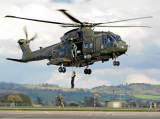UK News
-
 £1bn helicopter contract anchors 3,300 UK jobs and puts Yeovil at heart of global defence exports
A £1 billion defence contract awarded to Leonardo UK will secure thousands of skilled British jobs, strengthen the Armed Forces’ battlefield capabilities and open the door to as much as £15Read More...
£1bn helicopter contract anchors 3,300 UK jobs and puts Yeovil at heart of global defence exports
A £1 billion defence contract awarded to Leonardo UK will secure thousands of skilled British jobs, strengthen the Armed Forces’ battlefield capabilities and open the door to as much as £15Read More... -
 Rail fare freeze saves passengers £600m as government ends decades of price rises
Millions of rail passengers across England are beginning to feel the benefit of a landmark rail fare freeze, the first in 30 years, as the government moves to halt decadesRead More...
Rail fare freeze saves passengers £600m as government ends decades of price rises
Millions of rail passengers across England are beginning to feel the benefit of a landmark rail fare freeze, the first in 30 years, as the government moves to halt decadesRead More... -
 UK house prices edge higher as mortgage demand signals steady recovery
British house prices picked up slightly more momentum than expected in February, pointing to a tentative recovery after a late-2025 slowdown sparked by budget-related uncertainty, accordingRead More...
UK house prices edge higher as mortgage demand signals steady recovery
British house prices picked up slightly more momentum than expected in February, pointing to a tentative recovery after a late-2025 slowdown sparked by budget-related uncertainty, accordingRead More... -
 UK urges Washington to explain legal grounds for Iran strikes as regional tensions escalate
Britain has stopped short of endorsing recent U.S. and Israeli air strikes on Iran, saying it is up to Washington to clearly spell out the legal justification for the operationRead More...
UK urges Washington to explain legal grounds for Iran strikes as regional tensions escalate
Britain has stopped short of endorsing recent U.S. and Israeli air strikes on Iran, saying it is up to Washington to clearly spell out the legal justification for the operationRead More...

Culture
-
 UK music exports get £1.4m boost as 68 independent artists win global growth grants
Rising British music talent is set for a global push after 68 independent UK acts secured a combined £1.4 million in government-backed funding designed to grow international audiences, boostRead More...
UK music exports get £1.4m boost as 68 independent artists win global growth grants
Rising British music talent is set for a global push after 68 independent UK acts secured a combined £1.4 million in government-backed funding designed to grow international audiences, boostRead More... -
 Emery Walker revealed: new exhibition explores the man behind the arts and crafts legend
A new exhibition opening this spring at Emery Walker’s House sets out to restore depth, warmth, and personality to one of Britain’s most influential yetRead More...
Emery Walker revealed: new exhibition explores the man behind the arts and crafts legend
A new exhibition opening this spring at Emery Walker’s House sets out to restore depth, warmth, and personality to one of Britain’s most influential yetRead More... -
 London confirms St Patrick’s Day 2026 parade and Trafalgar Square festival
London will turn green once again next spring after the Mayor confirmed the capital’s St Patrick’s Day celebrations will take place on Sunday 15 March 2026, with aRead More...
London confirms St Patrick’s Day 2026 parade and Trafalgar Square festival
London will turn green once again next spring after the Mayor confirmed the capital’s St Patrick’s Day celebrations will take place on Sunday 15 March 2026, with aRead More... -
 Masterpieces beyond the Museum: National Gallery brings life-size art to communities ccross the UK
World-famous paintings from the National Gallery are stepping out of Trafalgar Square and into everyday life, as part of a major touring project that will seeRead More...
Masterpieces beyond the Museum: National Gallery brings life-size art to communities ccross the UK
World-famous paintings from the National Gallery are stepping out of Trafalgar Square and into everyday life, as part of a major touring project that will seeRead More... -
 Award-winning Polish writer Mariusz Szczygieł brings ‘Not There’ essay collection on UK tour
Polish writer Mariusz Szczygieł, one of Central Europe’s most acclaimed literary reporters, will tour the UK later this month with a series of public events marking the English-language release...Read More...
Award-winning Polish writer Mariusz Szczygieł brings ‘Not There’ essay collection on UK tour
Polish writer Mariusz Szczygieł, one of Central Europe’s most acclaimed literary reporters, will tour the UK later this month with a series of public events marking the English-language release...Read More... -
 Professor Dame Carol Black GBE reappointed as Chair of the British Library for 2026–2027
The UK Secretary of State has confirmed the extension of Professor Dame Carol Black GBE as Chair of the British Library, continuing her leadership from 1 September 2026 to 31 August 2027.Read More...
Professor Dame Carol Black GBE reappointed as Chair of the British Library for 2026–2027
The UK Secretary of State has confirmed the extension of Professor Dame Carol Black GBE as Chair of the British Library, continuing her leadership from 1 September 2026 to 31 August 2027.Read More... -
 Climate, community and care: Soma Surovi Jannat’s landmark exhibition at the Ashmolean Museum
From spring through autumn 2026, the Ashmolean Museum presents 'Soma Surovi Jannat: Climate Culture Care', a powerful new exhibition that places climateRead More...
Climate, community and care: Soma Surovi Jannat’s landmark exhibition at the Ashmolean Museum
From spring through autumn 2026, the Ashmolean Museum presents 'Soma Surovi Jannat: Climate Culture Care', a powerful new exhibition that places climateRead More... -
 Londoners on trial: 700 years of crime revealed in a free City archives exhibition
From medieval pickpockets to notorious Victorian figures, seven centuries of crime, punishment and public fascination are laid bare in a new exhibition atRead More...
Londoners on trial: 700 years of crime revealed in a free City archives exhibition
From medieval pickpockets to notorious Victorian figures, seven centuries of crime, punishment and public fascination are laid bare in a new exhibition atRead More... -
 Lost for centuries, Henry VIII’s golden love pendant finds a home at the British Museum
A golden heart pendant once symbolizing the doomed marriage of Henry VIII and Katherine of Aragon has finally been secured for permanent display at the BritishRead More...
Lost for centuries, Henry VIII’s golden love pendant finds a home at the British Museum
A golden heart pendant once symbolizing the doomed marriage of Henry VIII and Katherine of Aragon has finally been secured for permanent display at the BritishRead More... -
 British High Commission hosts Caledonian Ball in Lahore to celebrate growing Scotland–Pakistan partnership
The British High Commission brought a touch of Scotland to Lahore this week as it hosted the Caledonian Ball at the historic Sir Ganga Ram Residence, celebratingRead More...
British High Commission hosts Caledonian Ball in Lahore to celebrate growing Scotland–Pakistan partnership
The British High Commission brought a touch of Scotland to Lahore this week as it hosted the Caledonian Ball at the historic Sir Ganga Ram Residence, celebratingRead More... -
 300-year-old Rysbrack Marble putti blocked from export as UK scrambles to save national treasure
A three-century-old marble sculpture by renowned eighteenth-century sculptor Michael Rysbrack has been placed under a temporary UK export ban, giving BritishRead More...
300-year-old Rysbrack Marble putti blocked from export as UK scrambles to save national treasure
A three-century-old marble sculpture by renowned eighteenth-century sculptor Michael Rysbrack has been placed under a temporary UK export ban, giving BritishRead More... -
 Inside ICG PR: how an international PR agency shapes reputation for luxury, fashion, and cultural brands
Interview: the co-founder of Iris Consulting Group Iryna Kotlyarevska on building global visibility with cultural intelligenceRead More...
Inside ICG PR: how an international PR agency shapes reputation for luxury, fashion, and cultural brands
Interview: the co-founder of Iris Consulting Group Iryna Kotlyarevska on building global visibility with cultural intelligenceRead More...

British Queen celebrates
Most Read
- Teen held after US woman killed in London stabbings
- Heave-ho Harry! Prince prepares to join the walking wounded in ice trek to North Pole
- Football: Farhad Moshiri adamant Everton deal above board
- "Master of English Style". Interview with Designer Lydia Dart
- Letter to the Financial Times from Lord Mayor Alderman Michael Bear
World News

The Prime Minister will travel to Germany today (Saturday) for discussions with European allies amid increasing concern about the likelihood of a further Russian invasion of Ukraine.

Talks were held in the Russian Ministry of Defence in Moscow. This was the first time that the two nations’ defence ministers have met since General Shoygu visited London in 2013, and the

The Mayor of London, Sadiq Khan, has demanded that the Government acts now to put a stop to the capital being used for international money laundering. He’s urging ministers to draw up a

HMS Montrose, a Royal Navy ship operating as part of the Combined Maritime Forces (CMF), has seized over 1 tonne of illicit drugs in the Gulf of Oman worth almost £15 million.

- 2022 to be a blockbuster year for the nation, with Her Majesty The Queen’s Platinum Jubilee, the Birmingham 2022 Commonwealth Games and Unboxed: Creativity in

The United States and France held the fourth U.S.-France Cyber Dialogue virtually on January 13-14, 2022. Representatives of the two countries emphasized the importance of transatlantic

The Prime Minister spoke to Naftali Bennett, Prime Minister of Israel, earlier today.

Correspondent: – Dear Rabbi Benzion Kaplan, thank you very much for taking the time to answer our questions. You are one of the most prominent rabbis of modern Europe; both ordinary

Senior European Commission officials met yesterday with senior White House and other U.S. government officials on progress and next steps towards achieving the US-EU Agenda for Beating

President Biden today signed the Uyghur Forced Labor Prevention Act, underscoring the United States’ commitment to combatting forced labor, including in the context of the ongoing genocide




















